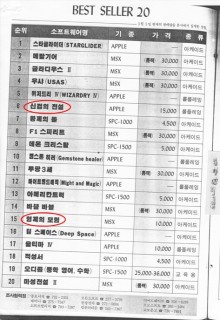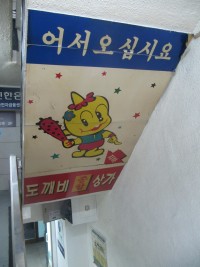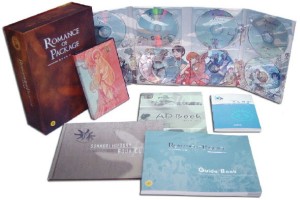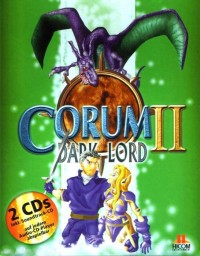A History of Korean Gaming
Getting to know (and maybe even play) old Korean games
After reading about all this stuff, you might ask "Wow, how do I get to play all these games I've never seen before?" Sadly, the answer for many old Korean games lies only in legally grey areas. Especially in the early years, domestic games were a rather small niche in a market full of cheap pirate copies and superior Japanese and North American imports. The fact that some of the old home computer companies entertained trade-in programs didn't help the legacy, either.
The Goblin Shopping Center,
one of the few places to find
old Korean PC games
(mostly post-1999 releases)
While there are some stores in Korea specialized in classic games, pretty much everything released before 1996 is extremely rare, and can only be obtained through the various trading message boards in Korean gaming communities, if at all. Here the interested buyer should not only be prepared to pay triple digits (in US$ scale) for a boxed copy of most things floppy based (with some of them it is currently doubtful if a working copy even exists, anymore) and even some CD games (jewel case releases never seem to get expensive, though, no matter how incredibly rare they are), but also the barriers that come with the handicap of not being a Korean citizen. Due to Korean law on the regulation of the internet, almost every site that involves a signup process requires the Korean citizenship number. Many larger sites nowadays support also the alien resident registration number, but getting that would be quite a big step to take just to get old obscure video games. Of course, this is not even taking into account the language barrier, as even game titles are hardly searchable in English.
When it comes to console and arcade games, even Korean retro gamers mostly rely on the work of well known game preservation projects, like SMS Power or MAME. Systematic preservation of games for platforms other than the PC is rare in Korea, with notable exceptions like Mayhouse's work for the preservation of SPC-1000 software. Even boxscans are almost impossible to come by. Much more frequent are photos of game boxes, that is why many cover images in this article have their perspective messed up. At least for PC games the situation is a bit better. There exist various documentation projects to collect the released titles of each developer, but those are often limited to very sparse information and completely lack screenshots. Almost all other knowledge traded around is of anecdotal nature, people talking about games they remember from their childhood and taking pictures of their stuff. There can be found a few more systematic and thorough approaches for some genres in the depths of online communities like Ruliweb, but still the games not even represented by a single screenshot on the web are legion (at least until now).
Windows era PC games are by far the easiest to come by, at least when in Korea, but those present other problems: While there is the occasional Western game that defies all attempts to get it to run on a modern operation system (modern meaning XP-ish), the majority will bend under the right measures. Not so in Korea. Here the ratio of games published before 2001 that are absolutely inaccessible on any operating system newer than Windows ME is disproportionately high.
Things don't look much better on the "official" side, either. Hardly any publisher or developer puts out classic games collections, in fact the only compilation of note is Sonnori's Romance of Package, covering all their games from the pre-online-only era. There had been a handful of smaller ones in the mid to late nineties, but they're just as hard to come by as the original releases by now1. The fact that offline PC gaming is dead in Korea renders it highly unlikely that more compilations are to show up, and the companies of those days that are still around can easily be counted on one's fingers, anyway. The void of providing the software itself is partly filled by various abandonware sites, but the older the games get, the bigger are the gaps. Of course those sites also lead to huge legal questionability, especially as many of them draw the line of what is considered abandonware rather generously. A lot of games available there are also mere demos without anyone ever mentioning the fact, others lack the copy protection codes necessary to proceed after the first stage, closing the circle of game preservationist's nightmares.
There's not only bad news for those interested in experiencing the games, though: From 1995 onwards, a decent number of games got localized to the Western market. Especially Germany had a similar demand of RTS titles and Diablo clones in the late 90s, and thus those two genres are rather well represented there and in the UK. This article also contains an attempt to list as many localized releases as possible. In addition to those, there have been at least two instances of MSX games being imported to the Netherlands by Dutch distributors, but they were spread in humble quantities2.
Anyone interested in searching for more info on Korean sites should check out the glossary for the original titles in Han'geul.
Preservation Sites:
English:
SMS Power Preservation of obscure SMS roms (and other Sega 8-bit systems) - Prototypes, pirates and the like
Famitek Documenting Korean Famicom soft- and hardware
Generation-MSX Extensive software database with country company overview
Korean:
Ruliweb Big gaming Cafe with tons of anecdotal information and even some systematic history articles. Also contains a trade area
Online Game Museum Documenting discontinued online games
Taksangs Collector's Blog. Documenting old console games and hardware
Han Hogyu Collector's Blog. Documenting mostly MSX based Hardware
Tiger Road Yet another collector's blog
Zanny & Jenny's playground On Samsung's SPC home computer series. Home to one of the only two SPC-1000 emulators
Mayhouse Blog for preservation and development of SPC-1000 software
Shops (Korean only, no international shipping!):
CD Gem Old and new PC games
Oldtoy Nostalgic toy shop that carries console and LCD game related stuff
Happy Toy Another toy store that carries some console related retro stuff
References
1. Family Production for example released a set consisting of Eol!, Olmang Jolmang Paradise, Interrupt, Pee & Gity Special and Digital Code around 1997, and HiCom released a series of 4-packs with its published games.
2. Saehan Sangsa reported to have shipped 5 different games (The Three Dragon Story, Brother Adventure, Puznic and others) to the Amsterdam-based store Centrum in July 1990. Then in 1994, a much greater variety of games and peripherals were sold by MSX Club Gouda. Other than almost the entire Zemina catalogue, they were also offering Daou's Dooley the Dinosaur and the Dr. Mario clone Dr. Hello (As can be seen in their diskmagazine Quasar issues #24 through #29). According to former Club Gouda member Arjan Prosman, the total amount of cartridges imported by them lay between 250-400 pieces, including bootlegged & licensed Japanese games and multi game carts, with a failure rate of up to 10% for the Korean carts, which apparently weren't of very good quality. Considering that more than 50 different carts were offered, anyone can do the math as to how many copies of each game might be surviving in the Netherlands.



